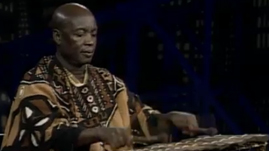Teachers' Domain - Digital Media for the Classroom and Professional Development
User: Preview



Yaya Diallo, a musician from Mali, talks about how he came to live in Kentucky, the healing properties of music, and his interest in new forms of African music that combine the music of the elders with that of young people. Then he introduces the piece he will perform, describing it as a “thank you to ancestors.” He plays the balaphon and talking drum.
Find additional arts resources for your classroom at the KET Arts Toolkit website.
Mali, a landlocked country in western Africa, is a place of breathtaking landscapes; there are cliffs and undulating desert scenes. This is a land of beautiful artwork, from woodcarvings and masks to mud cloth—cloth that is woven, then hand-painted with designs passed down for many centuries, and then dipped in dyes made with mud. There are also castellated mosques made of mud and buildings carved of sandstone.
The people of Mali also express their creativity through dance and music, and the country has a vibrant contemporary music scene rich in tradition.
"Rare are the activities that do not involve music," says Yaya Diallo. Born in Mali, West Africa, and a member of the Minianka (Bamana) tribe, Diallo was raised in a culture that works, worships, lives, and breathes to the beat of the drum. Diallo was trained on balafon and hand drums by his grandfather and by his spiritual mentor, Nangape. Although he now lives in Louisville, Ky., and teaches and performs internationally, he returns frequently to his home in Mali to renew his ties with the elders. Seeing the teachings he grew up with gradually being lost to Westernization in his native country, he encourages the youth of his village to take pride in their cultural heritage. He is part of an ancient lineage of griots—storytellers, historians, praise-singers, and musical entertainers who educate and pass on Mali’s history and traditions.
African music has influenced many other musical cultures. When you go to an African party organized by Africans, Diallo says, you will be surprised by the choice of music. “In Africa, we appreciate rock ‘n’ roll, blues, reggae, rap, soul, R and B, salsa, meringue, samba, and rai. We Africans feel very connected to those forms of music. The basic beat in rock ‘n’ roll is the music of the blacksmith in my village. A Malian musician named Ali Farka Toure plays Malian music that has been connected to the origin of the American blues. Reggae is the hunter’s music from Mali and Guinea. When you take off the cursing from the rap, you get music of some sacred societies and Fulani daily activity.”
 Loading Standards
Loading Standards